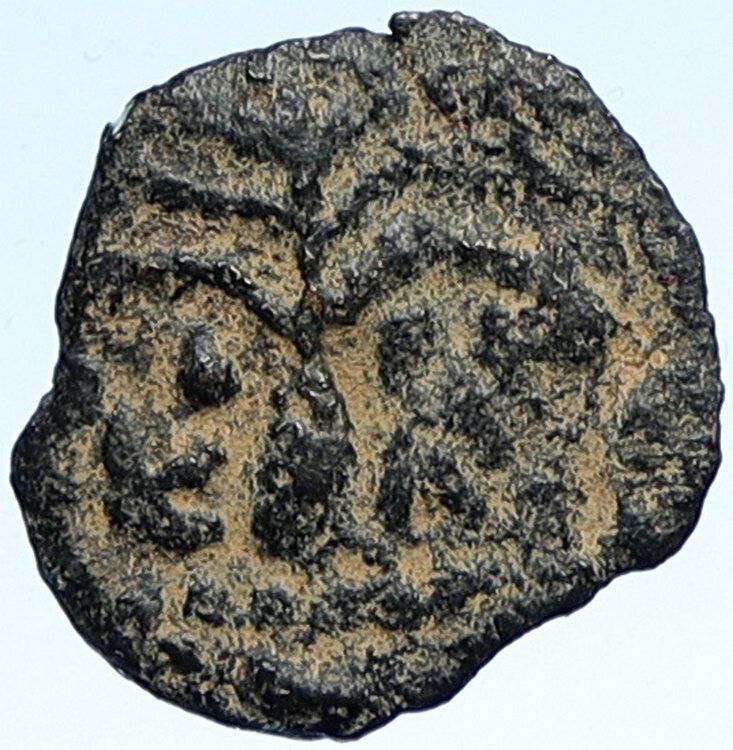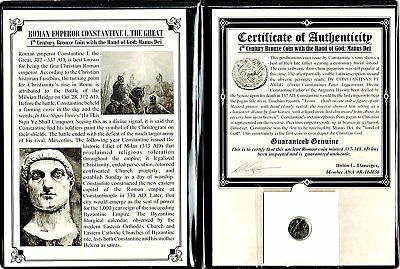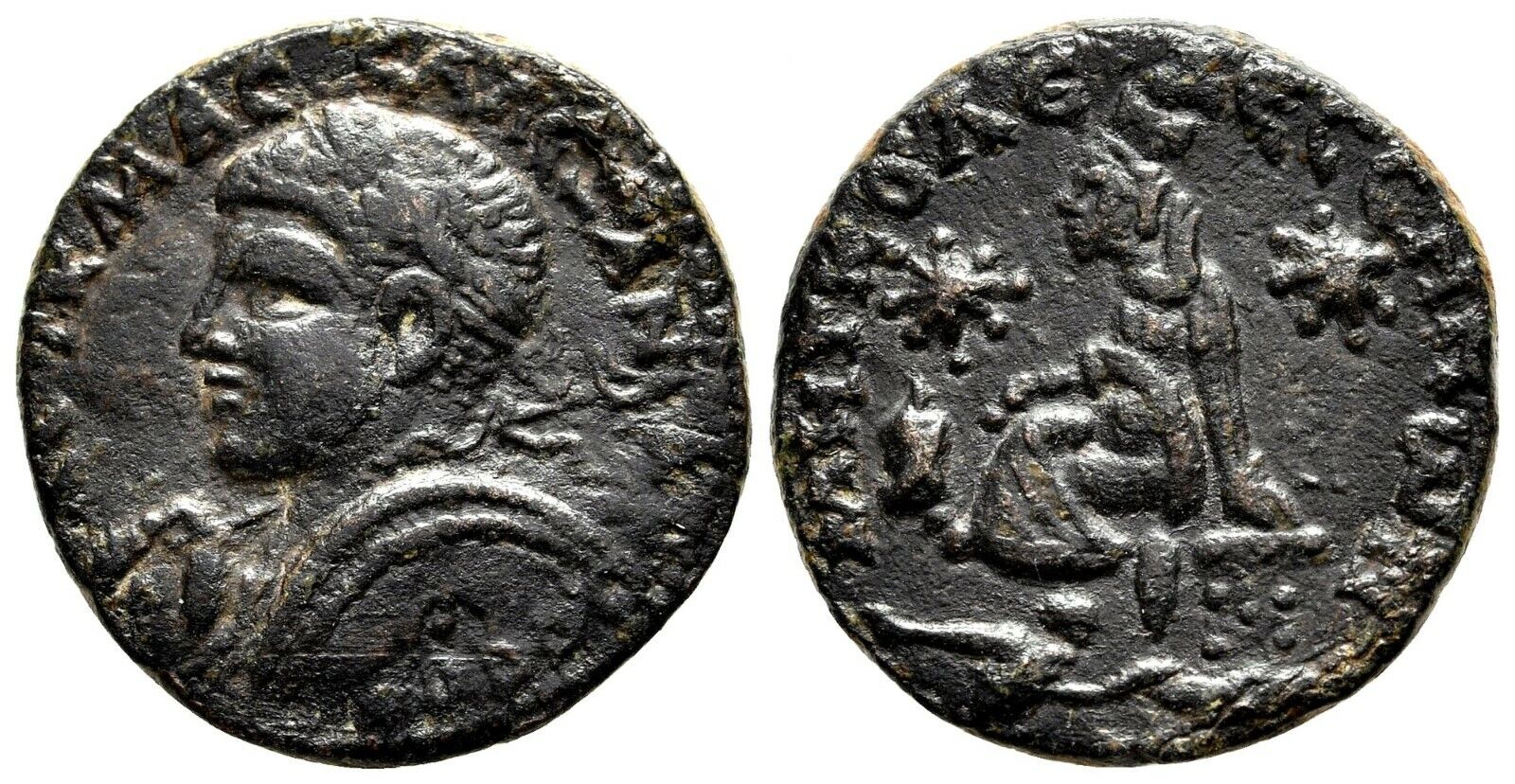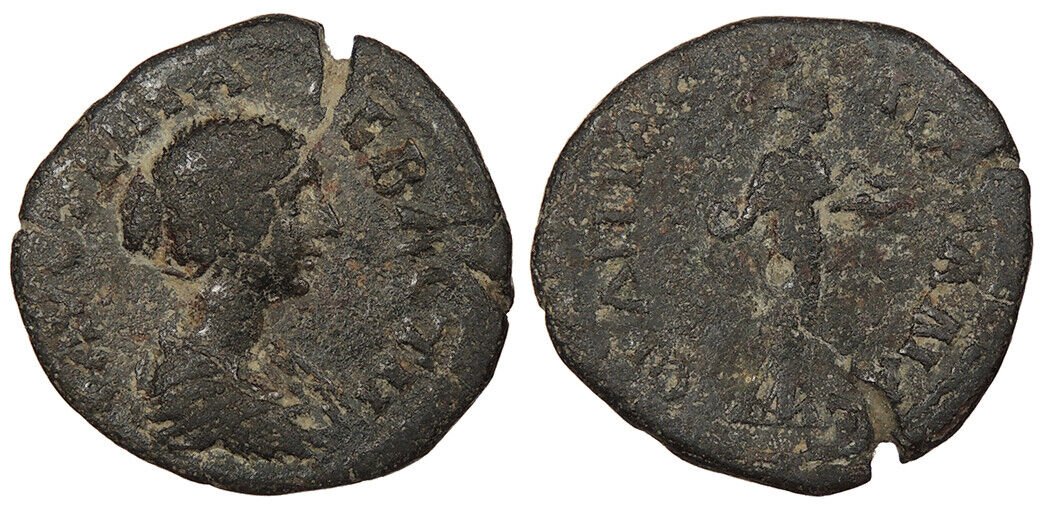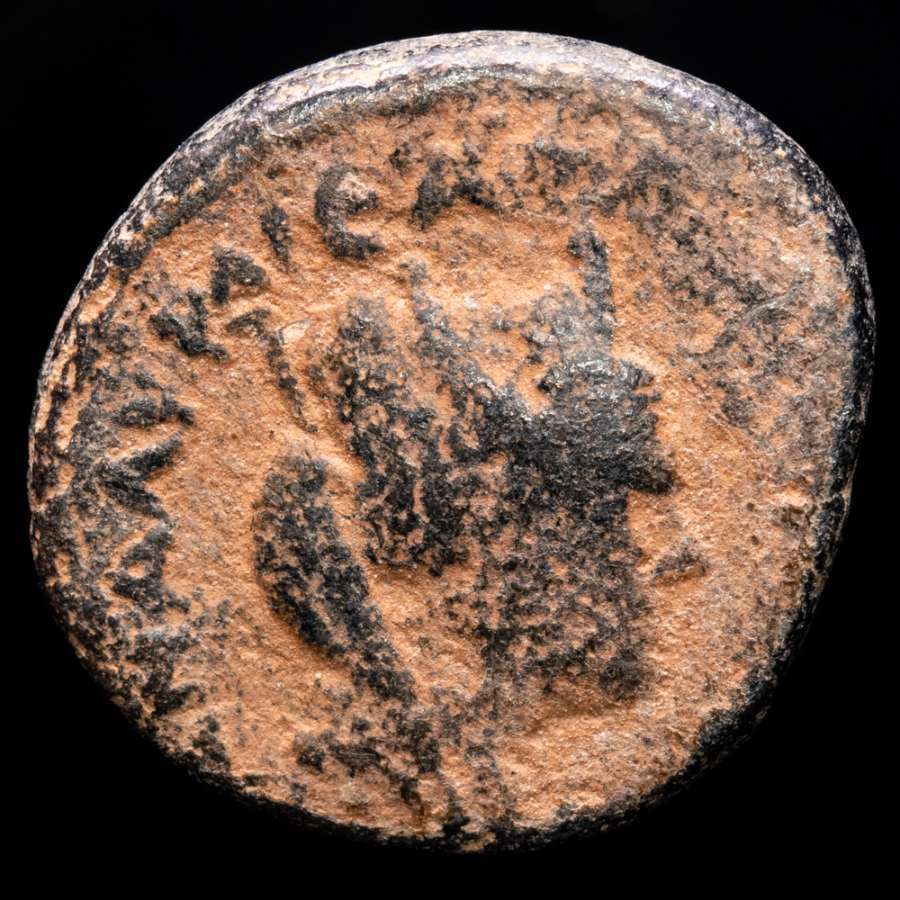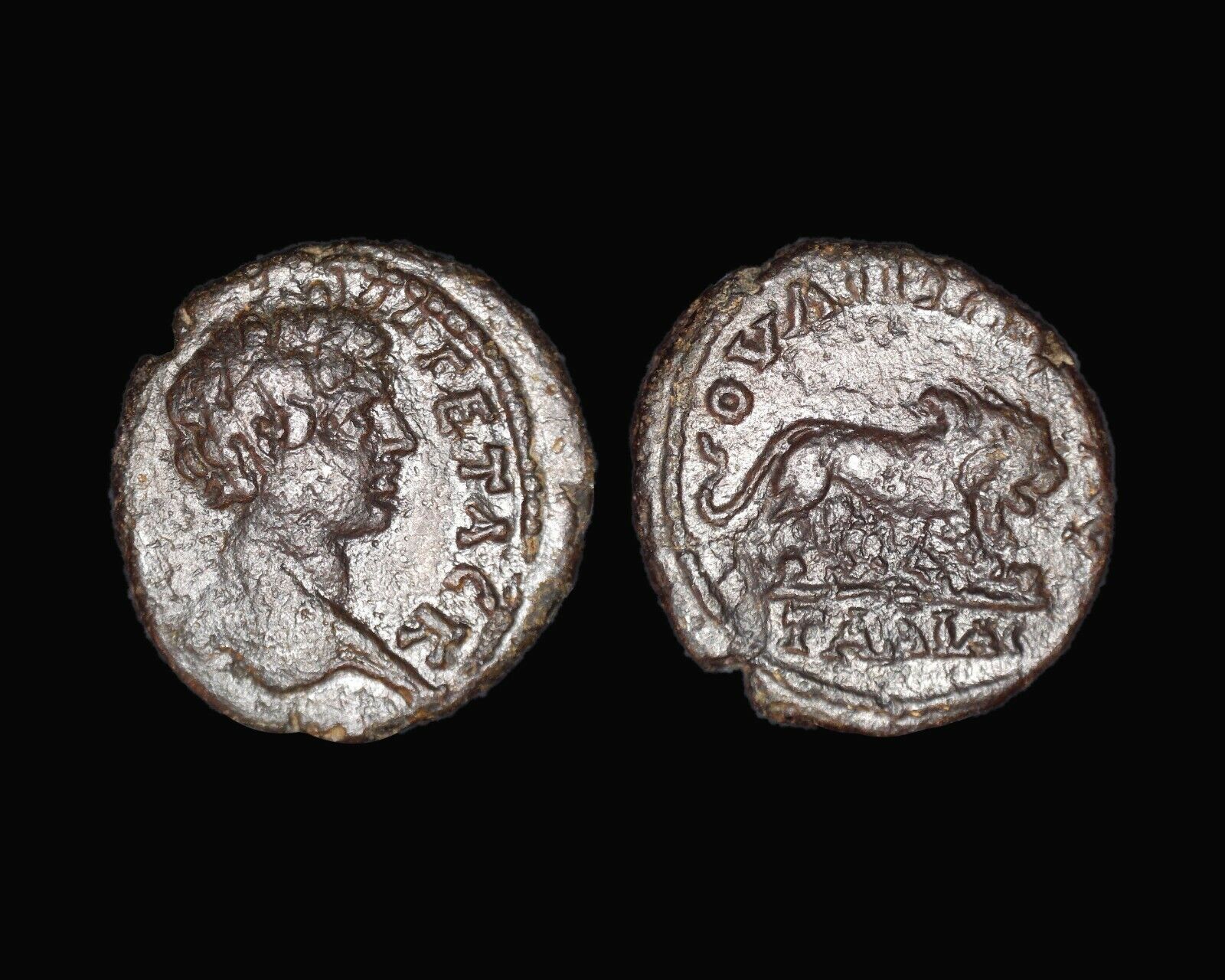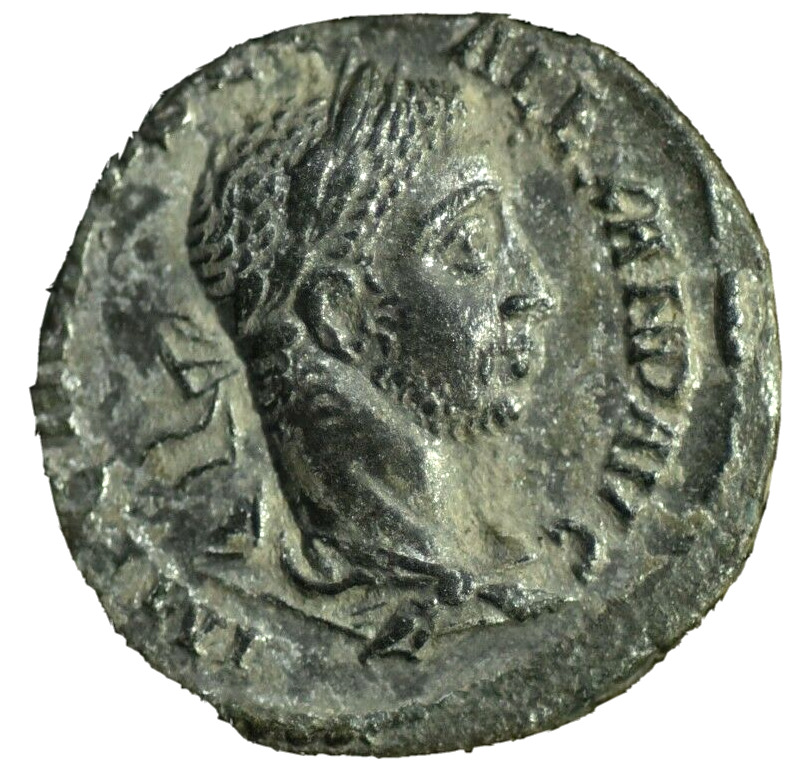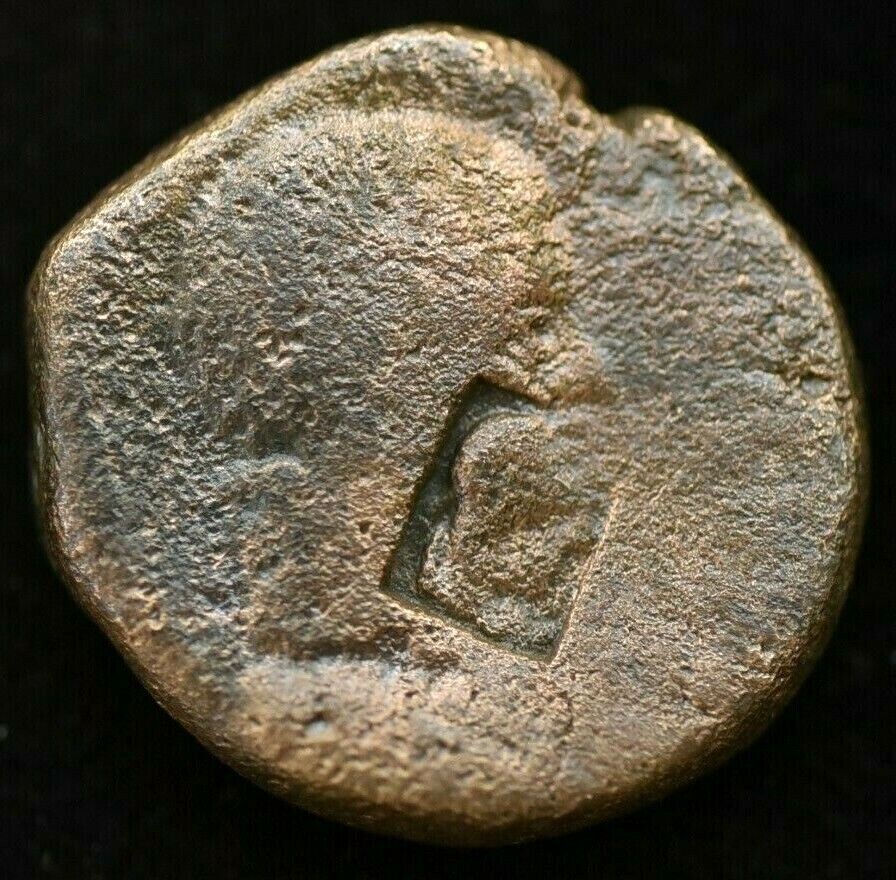-40%
BRITANNICUS NERO Antonius Felix Jerusalem Ancient Roman CLAUDIUS Coin i107280
$ 104.96
- Description
- Size Guide
Description
Item:i107280
Authentic Ancient Coin of:
Judaea under the Romans
Antonius Felix
- Prefect: 52-60 A.D. under Roman emperor
Claudius
and after
Nero
Bronze Prutah 15mm (1.65 grams)
Jerusalem
mint, struck 54 A.D.
Reference:
Hendin 1348
(5th Edition)
NEPW KΛAY KAICAP ("Nero Claudius Caesar" -
Nero
, adopted son of Claudius); two oblong shields and spears crossed.
BPIT ("
Britannicus
" - younger son of Claudius) above; LIΔ KAI (year 14 of Caesar = 54 A.D.) in fields; six-branched palm tree bearing two bunches of dates.
This coin names adopted son of emperor Claudius, the later emperor Nero and his biological son Britannicus on a coin from Jerusalem area known as Judaea. Nero had has rival Britannicus poisoned later when he became an emperor. This coins featuring his name is desirable as there were only a few issues with is name, or the super rare type with is portrait. Antonius Felix was the one before whom Saint Paul was brought when he was spreading Christianity, which was a very important historical time period.
You are bidding on the exact item pictured, provided with a Certificate of Authenticity and Lifetime Guarantee of Authenticity.
Starting with the Jewish Kings,
most coins were minted at the
Jerusalem
mint. The
Hosmoneon Dynasty
coinage begins with
John Hyrcanus I
(135-104 B.C.) followed by
Judah Aristobulus
(104 B.C.), then
Alexander Jannaeus
(104-76 B.C.). The
Herodian Dynasty
came next with
Herod I
(the Great) (40-4 B.C.), followed by
Herod Archelaus
(4 B.C. - 6 A.D.),
Herod Antipas
(4 B.C. - 39 A.D.),
Herod Philip
and
Herod Agrippa I
(41-44 A.D.).
Roman Procurator
coinage was issued under procurators and prefects of the province of
Judaea
which minted coins with names of contemporary emperors between circa 6 - 66 A.D. They minted only one denomination and size, the bronze Prutah. Not all of the procurators and prefects issued coinage in the province of Judaea under the Romans. Those that did issue coins were
Coponius
(6-9 A.D.) (under the Roman emperor
Augustus
, 27 B.C.-14A.D.),
Marcus Ambibulus
(9-12 A.D.),
Valerius Gratus
(15-18/26 A.D.) (time of Roman emperor
Tiberius
14-37 A.D.),
Pontius Pilate
(26-36 A.D.),
Antonius Felix
(52-60 A.D.) (under Roman emperor
Claudius
41-54 A.D.), and
Porcius Festus
(59-62 A.D.) (under emperor
Nero
54-68 A.D.). The last three procurators were Lucceius Albinus, Gessius Florus and Marcus Antonius Julianus. They did not issue any coins since the First Jewish-Roman War was brewing during emperor
Nero's
reign and the leaders of the revolt started issuing their own coins for the period known as the
Jewish War
(67-70 A.D.).
After the conquest of Jerusalem under
Vespasian
and
Titus
, this period of coinage ended and Romans commemorated the victories over Jerusalem and the surrounding area with
Judaea Capta
coinage.
Tiberius Claudius Caesar Britannicus
(c. 12 February AD 41 - 11 February AD 55), usually called
Britannicus
, was the son of Roman emperor Claudius and his third wife Valeria Messalina. For a time he was considered his father's heir, but that changed after his mother's downfall in 48, when it was revealed she had a bigamous marriage without Claudius' knowledge. The next year, his father married Agrippina the Younger, Claudius' fourth and final marriage. Their marriage was followed by the adoption of Agrippina's son, Lucius Domitius, whose name became Nero as a result. His step-brother would later be married to his sister Octavia, and soon eclipsed him as Claudius' heir. Following his father's death in October 54, Nero became emperor. The sudden death of Britannicus shortly before his fourteenth birthday is reported by all extant sources as a poisoning on Nero's orders - as Claudius' natural son, he represented a threat to Nero's claim to the throne.
Son of Claudius and Valeria Messalina | Brother of Claudia Octavia | Half-Brother of Claudia Antonia | Step-brother of Nero | Cousin of Nero Caesar, Drusus Caesar, Caligula, Agrippina Junior, Drusilla, Tiberius Gemellus, Germanicus Gemellus and Julia Livilla
Marcus Antonius Felix
(
Felix
, in Greek:
ὁ Φῆλιξ
, born between 5/10-?) was the Roman procurator of Iudaea Province 52-58, in succession to Ventidius Cumanus.
Felix was the younger brother of the Greek freedman Marcus Antonius Pallas. Pallas served as a secretary of the treasury during the reign of the Emperor Claudius. Felix was a Greek freedman either of Claudius, according to which theory Josephus (
Antiq.
xx. 7) calls him
Claudius Felix
, or for Claudius's mother Antonia Minor, a daughter of Triumvir Mark Antony to Octavia Minor and niece of Emperor Augustus. According to Tacitus, Pallas and Felix descended from the Greek Kings of Arcadia. Felix became the procurator by the petition of his brother.
Felix's cruelty and licentiousness, coupled with his accessibility to bribes (see Book of Acts 24:26), led to a great increase of crime in Judaea. The period of his rule was marked by internal feuds and disturbances, which he put down with severity.
After Paul the Apostle was arrested in Jerusalem and rescued from a plot against his life, the local Roman chiliarch Claudius Lysias transferred him to Caesarea, where he stood trial before Felix. On at least one further occasion Felix and his wife Drusilla heard Paul discourse, and later on frequently sent for Paul and talked with him (Acts 24:24-26). When Felix was succeeded as procurator, having already detained Paul for two years, he left him imprisoned as a favor to the Jews (Acts 24:27).
On returning to Rome, Felix was accused of using a dispute between the Jews and Syrians of Caesarea as a pretext to slay and plunder the inhabitants, but through the intercession of his brother, the freedman Pallas, who had great influence with the Emperor Nero, he escaped unpunished. Porcius Festus succeeded him as procurator of Judea.
Marriages and issues
Felix married three times. His first wife was Drusilla of Mauretania the Elder, daughter of Cleopatra Selene II and Juba II of Numidia, and sister to Ptolemy of Mauretania. Drusilla of Mauretania the Elder is often confused with her niece, Drusilla of Mauretania the Younger, daughter of her brother Ptolemy of Mauretania and Julia Urania. Felix' second wife was Drusilla of Judea, daughter of Herod Agrippa I and Cypros. Drusilla of Judea divorced Gaius Julius Azizus, King of Emesa to marry him. Felix and the Judean Drusilla, had a son, Marcus Antonius Agrippa, who died along with this Drusilla and many of the inhabitants of Pompeii and Herculaneum in the eruption of Mount Vesuvius on 24 August 79, and a daughter, Antonia Clementiana. The Judean Drusilla was one of only two major figures reported as dying in the eruption of Mount Vesuvius, the other being Pliny the Elder. Antonia Agrippina may have been a daughter from their son's marriage (this name was graffiti in a Royal Tomb in Egypt). Clementiana became a grandmother to a Lucius Anneius Domitius Proculus. Two possible descendants from this marriage are Marcus Antonius Fronto Salvianus (a quaestor) and his son Marcus Antonius Felix Magnus, a high priest in 225. After the eruption, Felix married for a third time, but little is known about his third wife.
Judea
(Hebrew: יהודה, Standard
Yehuda
Tiberian
Yehûḏāh
; Arabic: يهودا; Greek: Ἰουδαία; Latin:
IVDAEA
), sometimes spelled in its original Latin forms of
Judæa
,
Judaea
or
Iudaea
to distinguish it from the geographical region of Judea, was a Roman province that incorporated the geographical regions of Judea, Samaria, and Idumea, and which extended over parts of the former regions of the Hasmonean and Herodian kingdoms of Israel. It was named after Herod Archelaus's Tetrarchy of Judea, of which it was an expansion, the latter name deriving from the Kingdom of Judah of the 6th century BCE.
Rome's involvement in the area dated from 63 BCE, following the end of the Third Mithridatic War, when Rome made Syria a province. In that year, after the defeat of Mithridates VI of Pontus, the proconsul Pompeius Magnus (Pompey the Great) sacked Jerusalem and entered the Jerusalem Temple. Subsequently, during the 1st century BCE, the Herodian Kingdom was established as a Roman client kingdom and then in 6 CE parts became a province of the Roman Empire.
Judea province was the scene of unrest at its founding during the Census of Quirinius and several wars were fought in its history, known as the Jewish-Roman wars. The Temple was destroyed in 70 as part of the Great Jewish Revolt resulting in the institution of the Fiscus Judaicus, and after Bar Kokhba's revolt (132-135 CE), the Roman Emperor Hadrian changed the name of the province to
Syria Palaestina
and Jerusalem to
Aelia Capitolina
, which certain scholars conclude was done in an attempt to remove the relationship of the Jewish people to the region.
Nero
- 54-68 A.D.
Caesar, 50-54 (Under Claudius)
| Son of
Agrippina Junior
(by Ahenobarbus) | Husband of
Claudia Octavia
,
Poppaea
and
Statilia Messalina
| Father of Claudia Neronis | Adopted son, grand-nephew, and successor of
Claudius
| Step-brother of
Claudia Antonia
,
Britannicus
and
Claudia Octavia
| Nephew of
Caligula
| Grandson of
Germanicus
and
Agrippina Senior
| Great-grandson of
Agrippa
,
Julia
,
Nero Claudius Drusus
and
Antonia
|
Nero
(Latin:
Nero Claudius Caesar Augustus Germanicus
;15 December 37 - 9 June 68) was Roman Emperor from 54 to 68, and the last in the Julio-Claudian dynasty. Nero was adopted by his great uncle Claudius to become his heir and successor, and succeeded to the throne in 54 following Claudius' death.
During his reign, Nero focused much of his attention on diplomacy, trade, and enhancing the cultural life of the Empire. He ordered theaters built and promoted athletic games. During his reign, the redoubtable general Corbulo conducted a successful war and negotiated peace with the Parthian Empire. His general Suetonius Paulinus crushed a revolt in Britain. Nero annexed the Bosporan Kingdom to the Empire and began the First Roman-Jewish War.
In 64, most of Rome was destroyed in the Great Fire of Rome, which many Romans believed Nero himself had started in order to clear land for his planned palatial complex, the Domus Aurea. In 68, the rebellion of Vindex in Gaul and later the acclamation of Galba in Hispania drove Nero from the throne. Facing assassination, he committed suicide on 9 June 68 (the first Roman emperor to do so) His death ended the Julio-Claudian Dynasty, sparking a brief period of civil wars known as the Year of the Four Emperors. Nero's rule is often associated with tyranny and extravagance. He is known for many executions, including that of his mother, and the probable murder by poison of his stepbrother Britannicus.
He is infamously known as the Emperor who "fiddled while Rome burned" and as an early persecutor of Christians. He was known for having captured Christians to burn them in his garden at night for a source of light. This view is based on the writings of Tacitus, Suetonius, and Cassius Dio, the main surviving sources for Nero's reign. Few surviving sources paint Nero in a favorable light. Some sources, though, including some mentioned above, portray him as an emperor who was popular with the common Roman people, especially in the East. Some modern historians question the reliability of ancient sources when reporting on Nero's tyrannical acts.
Judea
(Hebrew: יהודה, Standard
Yehuda
Tiberian
Yehûḏāh
; Arabic: يهودا; Greek: Ἰουδαία; Latin:
IVDAEA
), sometimes spelled in its original Latin forms of
Judæa
,
Judaea
or
Iudaea
to distinguish it from the geographical region of Judea, was a Roman province that incorporated the geographical regions of Judea, Samaria, and Idumea, and which extended over parts of the former regions of the Hasmonean and Herodian kingdoms of Israel. It was named after Herod Archelaus's Tetrarchy of Judea, of which it was an expansion, the latter name deriving from the Kingdom of Judah of the 6th century BCE.
Rome's involvement in the area dated from 63 BCE, following the end of the Third Mithridatic War, when Rome made Syria a province. In that year, after the defeat of Mithridates VI of Pontus, the proconsul Pompeius Magnus (Pompey the Great) sacked Jerusalem and entered the Jerusalem Temple. Subsequently, during the 1st century BCE, the Herodian Kingdom was established as a Roman client kingdom and then in 6 CE parts became a province of the Roman Empire.
Judea province was the scene of unrest at its founding during the Census of Quirinius and several wars were fought in its history, known as the Jewish-Roman wars. The Temple was destroyed in 70 as part of the Great Jewish Revolt resulting in the institution of the Fiscus Judaicus, and after Bar Kokhba's revolt (132-135 CE), the Roman Emperor Hadrian changed the name of the province to
Syria Palaestina
and Jerusalem to
Aelia Capitolina
, which certain scholars conclude was done in an attempt to remove the relationship of the Jewish people to the region.
Claudius
-
Roman Emperor
: 41-54 A.D.
| Son of
Nero Claudius Drusus
and
Antonia
| Brother of
Germanicus
and
Livilla
| Husband of Plautia Urgulanilla, Aelia Paetina,
Valeria Messalina
and Agrippina Junior | Father of
Britannicus
,
Claudia Octavia
and Claudia Antonia | Granduncle and adoptive step-father of
Nero
| Nephew of
Tiberius
| Grandson of
Livia
,
Mark Antony
and
Octavia
| Uncle of
Nero Caesar
,
Drusus Caesar
,
Caligula
,
Agrippina Junior
,
Drusilla
, Julia Livilla, Tiberius Gemellus, Germanicus Gemellus and Livia Julia | Brother-in-law of Gaius Caesar, Drusus and
Agrippina Senior
|
Tiberius Claudius Caesar Augustus Germanicus
(1 August 10 BC - 13 October AD 54) (
Tiberius Claudius Drusus
from birth to AD 4, then
Tiberius Claudius Nero Germanicus
from then until his accession) was the fourth Roman Emperor, a member of the Julio-Claudian dynasty, ruling from 24 January AD 41 to his death in AD 54. Born in Lugdunum in Gaul (modern-day Lyon, France), to Drusus and Antonia Minor, he was the first Roman Emperor to be born outside Italia.
He was reportedly afflicted with some type of disability, and his family had virtually excluded him from public office until his consulship with his nephew Caligula in AD 37. This infirmity may have saved him from the fate of many other Roman nobles during the purges of Tiberius' and Caligula's reigns; potential enemies did not see him as a serious threat to them. His very survival led to his being declared emperor (reportedly because the Praetorian Guard insisted) after Caligula's assassination, at which point he was the last adult male of his family.
Despite his lack of political experience, Claudius proved to be an able administrator and a great builder of public works. His reign saw an expansion of the empire, including the conquest of Britain. He took a personal interest in the law, presided at public trials, and issued up to 20 edicts a day; however, he was seen as vulnerable throughout his rule, particularly by the nobility. Claudius was constantly forced to shore up his position. This resulted in the deaths of many senators. Claudius also suffered setbacks in his personal life, one of which may have led to his murder. These events damaged his reputation among the ancient writers, though more recent historians have revised this opinion.
Frequently Asked Questions
Mr. Ilya Zlobin
, world-renowned expert numismatist, enthusiast, author and dealer in authentic ancient Greek, ancient Roman, ancient Byzantine, world coins & more.
Who am I dealing with?
You are dealing with Ilya Zlobin, ancient coin expert, enthusiast, author and dealer with an online store having a selection of over 15,000 items with great positive feedback from verified buyers and over 10 years experience dealing with over 57,000 ancient and world coins and artifacts. Ilya Zlobin is an independent individual who has a passion for coin collecting, research and understanding the importance of the historical context and significance all coins and objects represent. Most others are only concerned with selling you, Ilya Zlobin is most interested in educating you on the subject, and providing the largest selection, most professional presentation and service for the best long-term value for collectors worldwide creating returning patrons sharing in the passion of ancient and world coin collecting for a lifetime.
How long until my order is shipped?
Orders are shipped by the next business day (after receipt of payment) most of the time.
How will I know when the order was shipped?
After your order has shipped, you will be left positive feedback, and that date could be used as a basis of estimating an arrival date. Any tracking number would be found under your 'Purchase history' tab.
USPS First Class mail takes about 3-5 business days to arrive in the U.S. International shipping times cannot be estimated as they vary from country to country.
Standard international mail to many countries
does not
include a tracking number, and can also be slow sometimes.
For a tracking number and signature confirmation, you may want to do Express Mail International Shipping, which costs more, however, is the fastest and most secure. Additionally you may be able to receive your order in as little as 3-5 business days using this method. For Express Mail International, it may be possible to place up to 10-15 items in one package (for the one shipping cost) as it is flat rate envelope, which may be the most cost-effective, secure and fastest way to receive items internationally. Send me a message about this and I can update your invoice should you want this method.
Getting your order to you, quickly and securely is a top priority and is taken seriously here.
Great care is taken in packaging and mailing every item securely and quickly.
Please be aware, I cannot take responsibility for any postal service delivery delays, especially for international packages as it may happen in rare instances.
What is a certificate of authenticity and what guarantees do you give that the item is authentic?
Each of the items sold here, is provided with a Certificate of Authenticity, and a Lifetime Guarantee of Authenticity, issued by a world-renowned numismatic and antique expert that has identified over 57,000 ancient coins and has provided them with the same guarantee. You will be very happy with what you get with the COA; a professional presentation of the coin, with all of the relevant information and a picture of the coin you saw in the listing. Additionally, the coin is inside it's own protective coin flip (holder), with a 2x2 inch description of the coin matching the individual number on the COA.
On the free-market such a presentation alone, can be considered a - value all in itself, and it comes standard with your purchases from me,
FREE.
With every purchase, you are leveraging my many years of experience to get a more complete context and understanding of the piece of history you are getting. Whether your goal is to collect or give the item as a gift, coins presented like this could be more prized and valued higher than items that were not given such care and attention to.
Buy a coin today and own a piece of history, guaranteed.
Is there a money back guarantee?
I offer a 30 day unconditional money back guarantee. I stand behind my coins and would be willing to exchange your order for either store credit towards other coins, or refund, minus shipping expenses, within 30 days from the receipt of your order. My goal is to have the returning customers for a lifetime, and I am so sure in my coins, their authenticity, numismatic value and beauty, I can offer such a guarantee.
When should I leave feedback?
Once you receive your order, please leave a positive feedback. Please don't leave any negative feedbacks, as it happens sometimes that people rush to leave feedback before letting sufficient time for their order to arrive. Also, if you sent an email, make sure to check for my reply in your messages before claiming that you didn't receive a response. The matter of fact is that any issues can be resolved, as reputation is most important to me. My goal is to provide superior products and quality of service.
How and where do I learn more about collecting ancient coins?
Visit the "
Guide on How to Use My Store
" for on an overview about using my store, with additional information and links to all other parts of my store which may include educational information on topics you are looking for.
